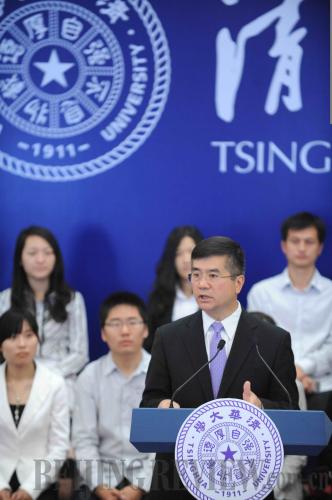|
 |
|
A NEW AUDIENCE: U.S. Secretary of Commerce Gary Locke delivers a speech on clean energy at Tsinghua University in Beijing on May 21 (CFP) |
The United States stands poised to cash in on China's growing appetite for alternative energy. This message rang loud and clear during a recent visit to China by U.S. Secretary of Commerce Gary Locke.
Locke arrived in Hong Kong on May 16 along with executives of 24 American clean energy companies—including General Electric Co., First Solar Inc. and Boeing Co. The visit represented the Obama administration's first cabinet-level trade mission to China to promote exports of cutting-edge U.S. technologies for clean energy and energy efficiency.
Locke went on to visit Shanghai, Beijing and Tianjin, meeting with government officials and business leaders, while giving speeches to scholars and students. He also attended the second round of the China-U.S. Strategic and Economic Dialogue (S&ED) in Beijing from May 24-25.
While meeting with Locke, Chinese Commerce Minister Chen Deming said China is ready to discuss opportunities with the United States for cooperation in alternative energy, carbon dioxide storage and capture, energy-efficient buildings and bio-fuel.
China, he added, welcomes U.S. companies' carrying out demonstration projects in the country to showcase clean energy technologies.
Committed to building itself into an "innovative country," Chen said, China has established intellectual property protection as a national priority and will redouble its efforts in this respect.
He noted, China's hi-tech sector possesses great potential for foreign exporters. The United States, however, practices export controls against China—thus depriving U.S. companies of many business opportunities. Chen noted that China hopes the United States will lift its export controls as soon as possible—a move he believes is in the interests of both U.S. businesses and consumers.
In November last year, the Chinese Government announced that China would cut carbon dioxide emissions per unit of GDP by 40-45 percent by 2020 compared with 2005 levels. China is expected to invest heavily in alternative energy to realize this goal.
The Obama administration, for its part, recently pledged to double exports and create 2 million jobs by 2015 under a "National Export Initiative."
Locke told Chen that the United States is reviewing its export control system and will push for reforms to reduce trade barriers. The United States has expressed its willingness to work closely with China in the field of clean energy for long-term benefits, he said.
During his trip to the northern port city of Tianjin, Locke visited the United Solar Ovonic Jinneng Ltd., a China-U.S. joint venture that produces thin-film solar laminates that convert sunlight to energy.
"Having visited United Solar's Michigan manufacturing facilities, I know that they are on the cutting edge of clean energy technology," Locke said. "This is a combination of U.S. and Chinese ingenuity that uses new technologies, creates jobs in both countries, and reduces our carbon footprint."
The joint venture in Tianjin will import solar cells from United Solar's sister plants in Michigan and assemble them into flexible solar laminates. At its full capacity, the Tianjin facility can produce enough solar power annually to eliminate 19,320 tons of carbon dioxide equivalent emissions in China, said a company news release.
Most of the clean energy products and technologies Locke promoted in China are on the U.S. Government's hi-tech export control list, according to Yao Jian, spokesman of China's Ministry of Commerce.
The proposed changes to the U.S. export control system would therefore help increase America's exports to China and other countries, thus reining in the country's longstanding trade deficit, he said. The move could also help the Obama administration to create more jobs while fulfilling its goal of doubling exports within the next five years.
At the same time, Yao pointed out that the current U.S. export control measures, which are based on the Export Administration Act passed in 1979 against the backdrop of the Cold War, have long been outdated.
For instance, China used to import 18 percent of hi-tech products from the United States, but the ratio has declined to 7 percent in recent years, he added. | 